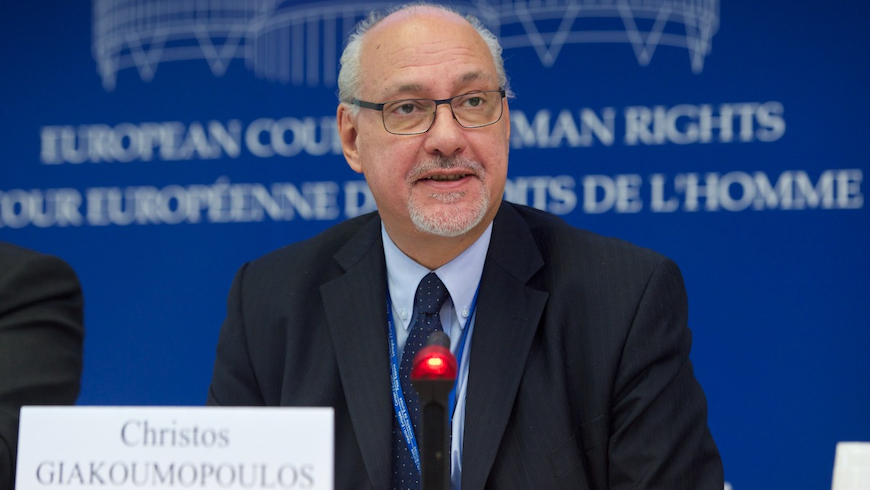Opening Statement by Christos Giakoumopoulos
82nd meeting of the Permanent Correspondents of the Pompidou Group
7 June 2018, Strasbourg
Good morning ladies and gentlemen. I warmly welcome you on the occasion of this —the 82nd— meeting of the Permanent Correspondents of the Pompidou Group.
It is a pleasure for me to address you now. But I owe you an apology for having taken almost a year since my appointment as Director General of Human Rights and Rule of Law. I intended to meet you during your last plenary meeting in November 2017, but another event took me away from Strasbourg on that occasion.
I must confess, however, that your work is not alien to me because —as Director of Human Rights, the post that I occupied before my current assignment in this same Directorate General— I have been alerted to certain aspects of your work. I welcomed in particular your work on people with drug problems confronted with criminal justice responsibilities and, especially, your growing emphasis on the human rights dimension in drug policy.
This —the human rights dimension— is one of the three points that I would like to make today, without prejudice to responding to other questions you may raise. But I have to inform you at the outset: I will have to leave you soon, not out of lack of interest or respect, but at 10 sharp I have to attend a Committee of Ministers meeting down the corridor.
The points I would like to make are:
- the need to provide added value,
- the fundamental importance of human rights, and
- my support for your work.
Not only value for money —in terms of performance and efficiency that goes without saying— but added value. In today’s reality, every organisation has to prove itself constantly, all have to adapt, and many have to reinvent themselves. Almost invariably, more of the same is not a sustainable option. Public administrations are no different. The vicissitudes of the Council of Europe are no different.
Of course, part of our current challenges —that you are certainly aware of — can be seen as conjectural: Turkey significantly reducing its contribution to the budget (after it voluntarily increased it beyond its statutory obligation) and the Russian Federation withholding payment of the contributions it owes to the Council for Europe. But other challenges are more fundamental and relate to our member states’ expectations. To face these challenges the Council of Europe has been engaged in a reform process, intended to modernise the organisation and make it more efficient and responsive to need. The process is ongoing. It is not all about efficiency. The Committee of Ministers, the Secretary General and the senior management in the organisation are keen on the idea of evaluation: not so much whether we are doing things right, but whether we are doing the right things. This concerns relevance, results and impact, tangible impact.
In your area of work —drug policy— the Pompidou Group was set up in 1971 in response to a particular reality quite different to today’s situation. It was incorporated into the Council of Europe in 1980, which gave it a competitive advantage stemming from the organisation’s structure, membership and value framework. Since then, competition —so to speak— has increased: UN bodies, EU institutions (some of them, like the EMCDDA, the European drugs observatory, deriving directly from the Pompidou Group’s own work), governments’ services and approaches, civil society organisations, ...
At the same time, there is more demand for avoiding overlap or duplication and for increasing complementarity.
I am aware that you are attentive to these matters, especially now that you are preparing the Ministerial Conference that will provide the broad lines for your work over the next four years. I can only encourage you to pursue this reflection, about innovative responses to old problems and about new or upcoming challenges, such as:
- performance enhancement substances,
- substance use among aging populations,
- the gender dimension,
- migrants and refugees, and demographic changes,
- non-substance related addictions or dependencies or what has been termed as “addiction by design” in digital environments, social media and electronic gaming that seek to emulate the reward / craving patters present in other addictions.
As regards these areas of possible expansion for the Pompidou Group, as in respect of the human rights dimension in drug policy, I can only encourage you to pursue your human rights vision undeterred.
As you stated in your repeated messages to the 2016 United Nations General Assembly Special Session on the world drug problem and the UN Commission on Narcotic Drugs, human rights is not a policy option, it is an obligation. You have also said it clearly in your November 2017 “statement on bringing human rights into drug policy development, implementation, monitoring and evaluation”, it is a very tangible obligation, that has to be acted upon at all stages of policy making and implementation, not just pretty words that embellish statements and declarations.
The European Court of Human Rights set very clearly the following principle: the Convention is “intended to guarantee not rights that are theoretical or illusory but rights that are practical and effective”. And it is high time to give concrete meaning to human rights in drug policy. I would advance that many of the rights protected by the European Convention on Human Rights are relevant to drug use and drug policy, starting from the right to life and physical integrity, all the way through to the prohibition of discrimination.
In general, civil and political rights entail negative obligations for the state: not to interfere with a right. In certain circumstances, however, they also bring about positive obligations: to act in order to protect. This may involve taking reasonable steps to facilitate or secure the enjoyment of rights or to prevent, minimise or redress interferences with the exercise of fundamental rights. Indeed, positive obligations seem particularly relevant in the area of drug policy; the opportunities for the reduction of harm resulting from drug use are a very clear example. Naturally, human rights are also very relevant to law enforcement aspects of drug policy.
Human rights have to be seen in the context of good governance, another key word in your proposed work programme for the next four years. Good governance is about ensuring that the right decisions are taken by public bodies. This is closely linked to the approach you have been defending of evidence-based policies, linking policy to research and science. Indeed, without taking full account of the most advanced scientific knowledge available, or if the evidence is disregarded, human rights are at risk. Good democratic governance is also about how decisions are taken: it requires involving those affected by drug policy in the discussion and decision-making about measures or policies that may concern them.
And I come to my third point that, in a way, brings the two previous points together: relevance and added value on the one hand, and human rights on the other. The Directorate General I – Human Rights and Rule of Law will support your work and will support any and every effort you make for your work to be relevant and to ensure that drug policy fully embraces and respects human rights. This has several practical aspects.
First, supporting you —the Pompidou Group— as a Council of Europe entity. We will defend your work and advocate for your needs as may be necessary to continue to provide you with a competent and effective secretariat, benefiting from the full trust and confidence of the DG. We will also take every opportunity to encourage states that are not yet or no longer members to join this partial agreement.
Secondly, we will support the transversal dimension of the work of the Pompidou Group across Council of Europe services. The Pompidou Group is not isolated, and should feel supported by other parts of the organisation whether within my responsibility —human rights, crime problems, social rights— or elsewhere in the Council of Europe.
To give you a couple of examples:
I am very pleased that your secretariat was instrumental to organising a Council of Europe side event at the March 2018 CND meeting against the death penalty.
The Council of Europe project on Human Rights Education for Legal Professionals (HELP) is set to develop a module on drug-related problems, which has my full support.
And I also support your secretariat constantly seeking contacts and synergies with other Council of Europe services: human rights in general, and also crime problems, cybercrime, corruption, children, gender equality.
And, finally, we will support your pursuit of the reflection on innovative responses to old problems and about new or upcoming challenges and, in particular, in developing further the human rights dimension in drug policy. This is indeed naturally the first priority for a Council of Europe.
Thank you very much for your attention




